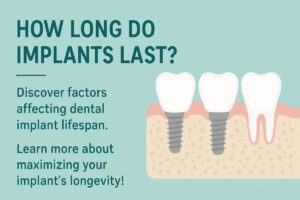This guide explains the most common long-term tooth replacement option for people missing one or more teeth. Read on to learn what dental implants are, who makes a good candidate, how the process works, and how implants compare to bridges and dentures. By the end you’ll have clear next steps to talk with a dentist about your options.
A Reliable Tooth Replacement Option: What Are Dental Implants?
Dental implants are a three-part system: a titanium fixture placed in the jaw, an abutment that connects the fixture to a replacement tooth, and a crown that looks like a natural tooth. As a tooth replacement option, implants restore chewing power, look natural, and help preserve jawbone that otherwise shrinks after tooth loss.
Major benefits include long-term durability, a natural appearance, improved bite and speech, and reduced bone loss over time. With proper care, implants often last decades, making them a strong choice for many patients.
Who Is a Good Candidate & What to Expect
Candidate checklist
- Healthy gums and enough jawbone to hold the implant
- Non-smoker or willing to quit during treatment and healing
- Chronic conditions like diabetes are controlled with medical care
- Good oral hygiene and realistic expectations about time and cost
Treatment steps and timeline
Treatment starts with a consultation and imaging to plan implant placement. During a short surgery the titanium fixture is placed into the jaw. Healing, called osseointegration, takes several months as the bone fuses to the implant. Once stable, an abutment is attached and a custom crown is placed. Typical timelines range from 3 to 6 months for a single implant; complex cases or low bone may need a bone graft or sinus lift, which adds time. Your dentist will outline each step and any additional treatments needed.
How Dental Implants Compare to Bridges and Dentures
Here’s a quick comparison to help you weigh choices. Implants generally last longest, feel most like natural teeth, and protect adjacent teeth and bone. Bridges and dentures can be less costly up front but may need replacement or adjustment sooner.
- Longevity: Implants often last decades; bridges 5–15 years; dentures need periodic refitting.
- Maintenance: Implants brush and floss like natural teeth; dentures require nightly cleaning and adhesives sometimes.
- Impact on adjacent teeth: Bridges may require filing down neighboring teeth; implants do not affect adjacent teeth.
- Cost (general ballpark): Implants have a higher upfront cost but can be greater long‑term value; bridges and dentures cost less initially.
- Who might prefer each: Implants for durability and bone health; bridges for replacing nearby single teeth quickly; dentures for broader, lower‑cost tooth replacement or when implants aren’t an option.
Ready to Talk About a Tooth Replacement Option?
If you’re considering a tooth replacement option, our experienced team offers a free or low‑cost consultation and flexible financing to fit your budget. Bring a photo ID, a list of current medications, and any recent dental X‑rays or records to your first visit. We’ll review your health history, exam your mouth, and outline personalized treatment choices.
Call or book online today to schedule your consultation and get a clear plan for restoring your smile.



